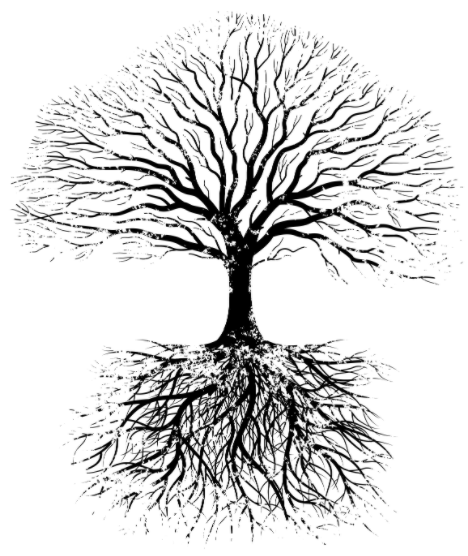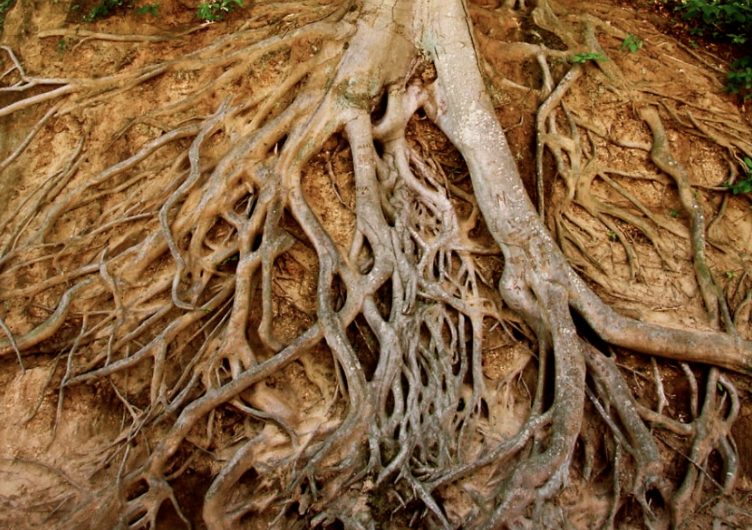Radix, radicis is the latin word for root. In order to be able to respond appropriately to any situation in life (= in a response-able and constructive way), we need to be aware of the roots of our actions. Why do we do, say, believe certain things? If we are not aware of these roots, we most likely re-act instead of taking appropriate action. Re-action means that we unconsciously repeat actions that are rooted in and based on past situations and experiences. Mostly, those past incidents have had a negative impact of some sort and triggered emotions such as fear, anger and sadness. If we are not aware that our behavior is rooted in negative past events, we keep reacting in a destructive racist ways. We are not able to act responsibly and to make conscious choices: racism in all its forms is a natural consequence of trauma – and not “just” limited to cultural discrimination. You can see it everywhere, if you look closely. It is omnipresent in our systems: political, relational, educational, medical, economical… All the systems currently established in (mainly) Western societies are inherently racist = they root in a negative (traumatic) experience.
As a collective we need to get down to the roots of things in order to deal with this reality. First, we need to become aware of and acknowledge the existence of racism in its many forms and shapes. The attitude of entitlement and superiority is often rooted in a deep feeling of insecurity, a fear of “not enough”, of being overpowered, overrun, not seen, not heard. This is the underlying trauma that is at the root of racist behaviour. It is time to address the roots to initiate fundamental changes.
This means to look inside, to explore the depths of ourselves – and encourage others to do the same when we encounter racism in our lives. It means to sensitise ourselves and to notice when we, or others in our surrounding, re-act in a racist way – and that we allow ourselves to look for the roots of this behaviour. It also means that we take a stand, call out and question racist re-actions.
I see examples of racism every single day. People who feel entitled to take resources, land, lives from others, re-enacting a past trauma and thus recreating the pain without thinking. People who oppose learning another language, acknowledging and respecting differences – cultures, customs, opinions, concepts – without feeling into the roots behind it all. People who (re-) act in unkind, disrespectful and cruel ways, sometimes without even noticing the effect of their behaviour - or without caring. Self-righteousness is the main hinderer on the road to eradicate racism.
Self-monitoring, introspection and self-questioning are the first steps to discover and unveil the roots of racist behaviour. Ask yourself: why do I react in a negative and opposing way? What triggers this re-action? What are my fears? What makes me angry? What hurts me? Write it all down or record your “rant” – let it out uncensored in a safe environment. And then revisit, re-read it a couple of days later – being honest and compassionate with yourself.
If you are questioned and challenged by others, stop and listen before you re-act and defend your position. You don’t have to answer straight away. Take time to notice and feel what their questions trigger within you. Allow your emotions to flow and follow them down to the roots. This will eventually lead to self-knowledge, self-compassion and self-understanding that are needed to change racist patterns and structures, within ourselves and our creations.
This means to look inside, to explore the depths of ourselves – and encourage others to do the same when we encounter racism in our lives. It means to sensitise ourselves and to notice when we, or others in our surrounding, re-act in a racist way – and that we allow ourselves to look for the roots of this behaviour. It also means that we take a stand, call out and question racist re-actions.
I see examples of racism every single day. People who feel entitled to take resources, land, lives from others, re-enacting a past trauma and thus recreating the pain without thinking. People who oppose learning another language, acknowledging and respecting differences – cultures, customs, opinions, concepts – without feeling into the roots behind it all. People who (re-) act in unkind, disrespectful and cruel ways, sometimes without even noticing the effect of their behaviour - or without caring. Self-righteousness is the main hinderer on the road to eradicate racism.
Self-monitoring, introspection and self-questioning are the first steps to discover and unveil the roots of racist behaviour. Ask yourself: why do I react in a negative and opposing way? What triggers this re-action? What are my fears? What makes me angry? What hurts me? Write it all down or record your “rant” – let it out uncensored in a safe environment. And then revisit, re-read it a couple of days later – being honest and compassionate with yourself.
If you are questioned and challenged by others, stop and listen before you re-act and defend your position. You don’t have to answer straight away. Take time to notice and feel what their questions trigger within you. Allow your emotions to flow and follow them down to the roots. This will eventually lead to self-knowledge, self-compassion and self-understanding that are needed to change racist patterns and structures, within ourselves and our creations.
If you are confronted with or suffering from racist behaviour, seek support and protection, find allies – there is a growing number of allies “out there”. Tell your stories, point out racist behaviour – so that together we can raise awareness and get down to the roots.



 RSS Feed
RSS Feed